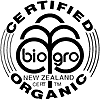Organic sales close in on £2 billion milestone
UK organic food and drink sales in the UK nudged the £2 billion mark in 2006 for the first time, according to the latest Soil Association Organic Market Report.
The organic industry has welcomed news that the market grew overall by 22% in 2006. Whilst this is a lower figure than 2005 (30%) it was achieved by sustained market growth throughout the year.
But the report contains a warning that 2007 may see growth slow as a result of “severe shortages in the supply of UK organic products”. It also shows that the supermarkets continue to dominate
retail sales, capturing 75% market share. However, independents saw organic sales rise by 37% in 2006 and their share of total organic retail sales move up 2% to 18%.
The report was launched to coincide with the start of Soil Association Organic Fortnight 2007. It shows that sales of organic products through organic box and mail order schemes and other direct
routes increased from £95 million in 2005 to £146 million in 2006 — an impressive 53% growth, more than double that experienced by the major supermarkets.
Organic textiles and the booming organic health and beauty sector are also shown to be experiencing particularly strong growth. 2006 saw a 30% increase in the number of health and beauty products
licensed with the Soil Association. At current growth rates, the UK market for organic cotton products is estimated to be worth £107 million by 2008.
The report includes consumer research by Mintel which shows that more than half of those surveyed had purchased organic fruit and vegetables within the previous 12 months; one in four consumers had
bought organic meat or dairy products; and one in six had purchased packaged organic goods.
But despite the steady growth in demand for organic food over the past decade, some key sectors are still failing to meet demand, says the Soil Association.?
Organic livestock sectors are dependent on supplies of organic feed, but UK self-sufficiency in organic cereals fell below 50%, during 2006, increasing reliance on imported organic grains. The cost
of livestock feed, whether for organic or non-organic farmers, is rising as a result of recent poor global harvests, increasing diversion of cereals into biofuel production and rapidly rising demand
particularly from China and India.
Commenting on the report’s findings, Helen Browning, the Soil Association’s director of food and farming, said: “These figures are extremely encouraging, the year on year growth in sales not
just in food and drink, but also the newer booming clothing and health and beauty sectors, confirm organic has moved well beyond a mere fad or niche.?
“The staggering 53% growth in sales through box schemes and other direct routes confirms strong public support for local, seasonal and organic food that provides a fair return to farmers and
growers, boosts the local economy, and also reduces your carbon footprint — consumers are increasingly linking everyday food choice to environmental action.
“While this year’s report confirms a positive future for organic food and farming, the organic movement faces challenges in the long-term from climate change and rising oil prices, as do all
farmers and growers. Rises in feed and fuel prices will need to be reflected in food prices at the check-out that enable farmers to get a fair return on their production costs. It’s fantastic to
have such strong public support for and understanding of the benefits provided by organic farming, but that must urgently extend to more widespread acceptance, by retailers as well as consumers, of
the true costs of producing staple foods like eggs, milk, meat, and bread sustainably.
“The significant short-fall in UK grown organic cereals is a major concern, forcing greater reliance on imports for livestock feed — but of course, it is also a major opportunity for current
non-organic cereal farmers to convert and supply a guaranteed and growing market.
“With the government’s own studies confirming organic farming typically uses 30% less energy than non-organic farming, it’s not surprising more people are choosing to purchase planet-friendly,
organic food. This is confirmed by an independent poll commissioned by the Soil Association from Mumsnet, which found 84% of mums believe that organic is better for their family and 90% for the
planet.”
Diversified Business Communications UK
Blenheim House
119 – 120 Church Street
Brighton
East Sussex
BN1 1UD
Tel: +44 (0)1273 645110
Fax: +44(0)1273 645169 .
http://www.naturalproductsonline.co.uk/home.asp?pcid=69
















